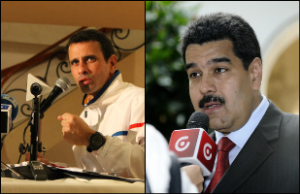By Fulton Armstrong

Cuban President Miguel Díaz-Canel. / Irene Pérez / Cubadebate / Flickr / Creative Commons
As Cuban President Miguel Díaz-Canel passed the six-month mark in office this month, his administration – not surprisingly – continued to produce no surprises. His rhetoric and policies, similar to the package of constitutional reforms now undergoing consulta popular and scheduled to be approved by referendum next February, are an extension of Raúl Castro’s tightrope walk between continuity and gradual change.
- Speaking at the UN General Assembly in September, Díaz-Canel condemned the “selfishness and exclusion” of capitalism as the cause of poverty, instability, climate change, and other ills. He also proclaimed, “The generational change in [Cuba’s] government should not deceive the enemies of the revolution; we are continuity, not rupture.” He welcomed the almost-friendless Venezuelan President Nicolás Maduro to join one of his biggest public appearances. Showing his pragmatic side, however, Díaz-Canel also met in New York with U.S. technology companies and icons of U.S. capitalism – Google, Bloomberg, Microsoft, Twitter, and others – declared his hope to “computerize [Cuban] society,” and welcomed the announcement of the first U.S.-Cuban biotech joint venture. Upon his return to Havana, he launched his own Twitter account.
- On economic reform, Díaz-Canel has continued the same halting approach toward market socialism as did Raúl. New regulations announced in July, to be implemented in December, seemed designed to restrain the growth of the private sector rather than accelerate the reform program. New mechanisms to ensure that cuentapropistas pay more taxes and operate within the law will dampen their growth in the short term and aggravate contradictions in current policies – for example, curbing black-market purchases of supplies without creating wholesale markets for them.
Ongoing national discussions on constitutional reforms, launched by the National Assembly in July, are compatible with Díaz-Canel’s approach to change.
- The new document reaffirms two tenets of the Communist Party’s revolutionary platform – the party’s continued leading role as sole political representative of the Cuban nation, and a commitment to a socialist system in which state property predominates and universal social services remain free. But, importantly, the draft omits the goal in the 1976 constitution of “building a Communist society,” signaling the leadership’s recognition that private property and markets will be a permanent feature of the new Cuban model. It reconfigures policymaking processes to increase efficiency (such as by formalizing the position of Prime Minister), increases the autonomy of local government, and separates more clearly executive and legislative functions. An amendment allowing same-sex marriage has sparked heated public debate and given rise to an unprecedented political organizing drive by churches opposed to it.
- The amended constitution does not significantly expand the space for private enterprise, but it provides a stronger legal foundation for the reforms that have already been implemented in various waves since 1992. The draft also strengthens protections of Cuban and foreign-owned private property and investment, providing guarantees against future expropriation.
When introducing changes over the years, the government has routinely, if not obsessively, emphasized continuity – and Díaz-Canel’s administration is proving to be no different. The signs of change are often nuanced, whereas hardline positions, which tamp down progressives’ expectations and assuage conservatives’ anxieties, are unmistakable. Díaz-Canel’s adherence to Raúl’s program gives him both essential political cover emphasizing continuity as well as a platform for continuing gradual change. That formula doesn’t help him with some major challenges, such as the need to unify the country’s two currencies, that have loomed large for several years. But Díaz-Canel’s gradualist approach – particularly if enshrined in a new constitution next year – is compatible with the view held by many Cubans that change should be evolutionary, not disruptive, even if they wish it went faster. Washington’s curtailment of bilateral normalization is depriving the private sector of much-needed resources to drive change, but the country’s continued international outreach and expansion of internet access have given entrepreneurs a moral, if not economic, lifeline. Cubans have often said they’ll do change “their own way,” and Díaz-Canel, with his abundance of caution, may be leading that process.
October 31, 2018








